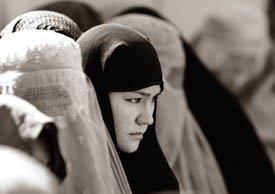|
DAILY NEWS ONLINE |
|
|
|
OTHER EDITIONS |
|
|
|
|
|
|
|
|
|
OTHER LINKS |
|
|
|
|
|
|
  |
|
Afghanistan: some gains for the voiceless
A major landmark in the revival of democratic institutions in Afghanistan has been reached with the conduct of a violence-free parliamentary poll. Afghan President Hamid Karzai was quoted as describing September 18, the day of the election, as " a historic day." He went on to say that it was a "day of self-determination for the Afghan people. That is why we are making history after 30 years of war, interventions, occupations and misery." Afghanistan has indeed come a considerable distance from those chronically violence-filled decades of the Seventies and Eighties but what is of significance is that the current poll is being conducted amid the military interventionist presence of the Western powers who had intermittently sought and maintained a foothold in the strategically important South-West Asian state. The question which needs to be broached is whether the Western camp, led by the US, would make amends in Afghanistan for its seeming failures in Iraq, where bloody internal conflicts and a relentless assault on the Western military presence by Iraqi rebel groups, have all but botched the country's journey towards independent, democratic governance. While only time would answer this poser fully, it would be safe to assume that Afghanistan would need the protective presence of the Western military alliance for an indefinite period if the currently -revived democratic institutions are to survive. It could be also said that we are having a deceptive calm in Afghanistan at present because the Taliban too has fielded candidates, although under different guises, for the poll. The Taliban - long considered the spoiling factor by the West and its backers - is likely to give "peace a chance" until the fate of its candidates becomes clear. However, the fact that the Taliban is once again militarily assertive, points to an uncertain future for Afghanistan, notwithstanding the gains it has made in terms of redemocratization. It could very well be that if the Taliban's candidates fare poorly at the polls the Taliban would strongly renew its bloody rebellion against the Karzai administration and its Western patrons. However, there is no denying that the people of Afghanistan have, to a limited degree at least, made themselves an important factor in governance. Even within limits, popular self-governance could be said to have revived in Afghanistan, with this election. An important dimension in this process of redemocratization is the reserving of some 68 seats for women in Afghanistan's 249 - seat legislature. This feature of the redemocratization exercise in Afghanistan needs to be sharply focused on in consideration of the long, many-dimensional repression suffered by Afghan women, particularly under Taliban rule. While the Taliban's political and social agenda had the effect of deeply entrenching conservatism and tradition in the Afghan polity, the granting of considerable political representation for women, would go some distance in giving modernity a chance in Afghanistan. If women at the grassroots too enjoy a degree of representation in the Afghan Parliament, the cause of women's empowerment could be considered as having been advanced. As in the case of other democracies, the success of Afghanistan's redemocratization experiment would need to be measured by the degree to which the hitherto voiceless find a voice in it. The fact that the Taliban too has entered the hustings through its proxies, needs to be welcomed because it would serve the cause of peace well if the Taliban enters mainstream politics, rather than continue to challenge the system from outside, by military means. Such achievements would need to be premised on the steady democratization of the Afghan polity. Ideally, secularism should upstage religious fundamentalism and steadily inform the institution-building process in Afghanistan if the conflict-ridden country is to be taken some distance on the road to normalcy. |
|
|
|


